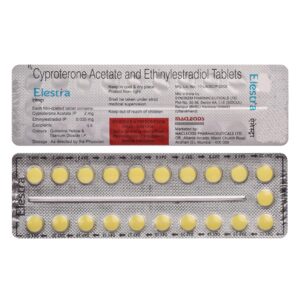ETHINYL ESTRADIOL + CYPROTERONE ACETATE
Ethinyl Estradiol: Ethinyl Estradiol is a synthetic form of the female hormone estrogen. It is commonly used as a component of oral contraceptives, also known as birth control pills.
The primary mechanism of action of ethinyl estradiol is to inhibit the release of follicle-stimulating hormone (FSH) and luteinizing hormone (LH) from the pituitary gland, thus preventing ovulation. It also thickens the cervical mucus, making it difficult for sperm to reach the uterus, and alters the lining of the uterus, making it less receptive to implantation.
The typical dose of ethinyl estradiol in combination oral contraceptives ranges from 20 to 50 micrograms per tablet, although the dosage may vary among different brands. It is usually taken once daily, preferably at the same time every day, for 21 days followed by a week of inactive or placebo pills, after which a new pack is started.
As with any drug, there are potential side effects of ethinyl estradiol. Common side effects include nausea, breast tenderness, headaches, mood changes, breakthrough bleeding or spotting between periods, and weight changes. These side effects are usually mild and tend to improve over time. However, if they persist or become severe, it is recommended to consult a healthcare professional.
Serious side effects of ethinyl estradiol that require immediate medical attention include chest pain, leg pain or swelling (indicating a possible blood clot), severe abdominal pain (signaling a potential problem with the liver or gallbladder), severe headaches (possibly indicating a stroke or high blood pressure), and yellowing of the skin or eyes (suggesting liver problems).
It is important to note that ethinyl estradiol should not be used by pregnant women, as it can harm the developing fetus. It is also contraindicated in individuals with a history of blood clots, certain types of cancers, liver disease, and uncontrolled high blood pressure.
Overall, ethinyl estradiol is an effective and widely used hormone in oral contraceptives, providing reliable contraception when used correctly. However, it is important to carefully consider and discuss potential risks and benefits with a healthcare provider before starting this medication.
Cyproterone Acetate: Cyproterone Acetate is a synthetic steroidal antiandrogen drug that is primarily used in the treatment of androgen-dependent conditions, such as prostate cancer, hirsutism (excessive hair growth), androgenetic alopecia (male pattern baldness), and as a component of hormone replacement therapy for transgender women.
The drug works by inhibiting the action of androgens, which are male sex hormones responsible for the development and maintenance of male characteristics. Cyproterone Acetate acts as a competitive antagonist at androgen receptors, preventing the binding of dihydrotestosterone (DHT) and testosterone to these receptors. It also has progestogenic properties and can suppress the production of luteinizing hormone (LH) and follicle-stimulating hormone (FSH) by feedback inhibition at the hypothalamic-pituitary level.
The dosage of Cyproterone Acetate varies depending on the condition being treated. For prostate cancer, the typical starting dose is 200 to 300 mg per day, whereas for hirsutism or androgenetic alopecia, the initial dose is usually 50 to 100 mg per day. The dose may be adjusted based on the individual’s response and tolerance.
As with any medication, Cyproterone Acetate can have side effects. Common side effects include drowsiness, fatigue, depression, decreased libido, erectile dysfunction, breast tenderness or enlargement, and weight gain. Menstrual irregularities or amenorrhea (absence of menstruation) can occur in women. Rare but serious adverse effects include liver toxicity, blood clotting disorders, and meningiomas (tumors of the meninges). It is important to discuss any concerns or potential side effects with a healthcare professional before starting this medication.

